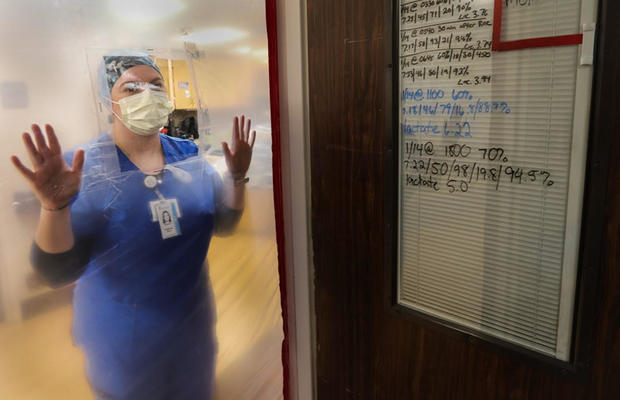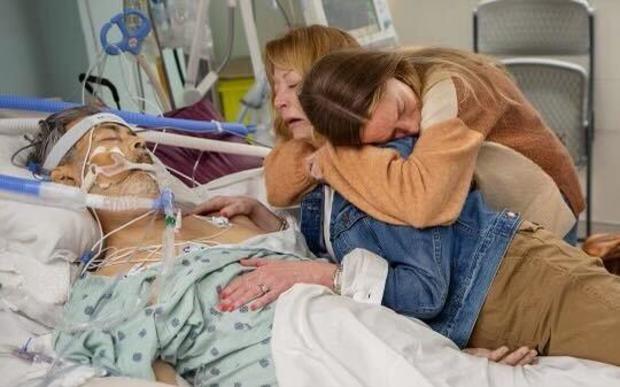Photojournalist-turned-nurse who takes pictures of COVID patients says his life has changed since CBS News profile
[ad_1]
When Alan Hawes goes to work at the Medical University of South Carolina, he brings with him a special ability — a talent, really — that he uses when he cares for the sickest of the sick COVID-19 patients: he takes pictures of what people outside the hospital would never see.
That’s because before he became a nurse 11 years ago, Hawes spent 23 years as a newspaper photographer, and that gives him the ability to tell the stories of these patients. His work on the front lines of the pandemic gave himself and the world some powerful perspective.
“CBS Mornings” lead national correspondent David Begnaud first told Hawes’ story last January. He recently spoke with Hawes again as part of a new weeklong “CBS Mornings” series where Begnaud is checking in with people he’s introduced us to over the past few years to ask one simple question: “How are you now?“
Hawes still photographs COVID patients, and the perspective those pictures bring has continued to widen. Back in January, he told Begnaud he wanted to give sight to what caregivers were seeing at the height of the pandemic.
“So many frontline workers have said to us, ‘If only the public could see what we see,'” Hawes said at the time.
One of his pictures shows a woman who was very sick with a prayer cloth her family had brought her as they couldn’t be there with her. She later died.
In another, a man is seen texting people on his cell phone telling them what’s going on. Hawes said he took that picture because he felt like “he knew where he was going.” The man ended up being intubated. He was unvaccinated but survived.
“I have quite a few times had a patient who’s unvaccinated, and I’ll think to myself, ‘You did this to yourself,'” Hawes told Begnaud in January.
“But that doesn’t last long. Part of being a good nurse is having empathy,” he said. “Once you hear the stories of some of our patients from their family members, you can become a fan of that person and you just know that they’ve made a bad decision.”
Hawes’ pictures help humanize those people. But he said he’s had a “really hard time” because nurses are emotionally “broken right now.”
Other scenes he’s captured include a mother holding a picture of a newborn she couldn’t touch, a girlfriend who kept a bedside journal, and one of Hawes’ own colleagues, a triple-vaccinated nurse who suffers from asthma.
Patients and family members give him permission to photograph them. Hawes said he does not take pictures of his own patients so the photos don’t interfere with his nursing job.
Hawes usually never sees those families again. But in January, he did get to see the wife of a 72-year-old patient who had died of COVID-19. CBS News captured the emotional reunion as the two held and thanked each other.
That was seven months ago.
When Begnaud checked in with him to see how he’s doing, Hawes said he’s been busy, but in a different way.
“We still have a lot of patients but not the amount of patients that we had before and they’re generally not as sick as they were before,” Hawes said, adding that his life has changed since the story originally aired.
“I heard from people all across the country,” he said. “I got handwritten notes sent to my house thanking me for everything that I do. I heard from health care workers across the country saying that they felt like I was speaking for them.”
Although he continues to see patients who don’t believe in the vaccine, Hawes said he finds himself not asking that question as much because he doesn’t want to know the answer.
Alan Hawes
One powerful scene he captured after the story aired earlier this year showed a family saying goodbye to a patient named Victor Rodriguez before withdrawing care from him.
“It was gut wrenching. There was a lot of love there, his wife climbed in bed with him to be with him for the last time,” Hawes said.
Those pictures have had a big impact on him.
“That was a really hard one to take,” Hawes said. “I didn’t want to disturb anything and when his wife, Diane, got in the bed with him, I just thought that was one of the most beautiful things that you could do during the last minutes that you’re going to have with your loved one.”
[ad_2]
Source link





